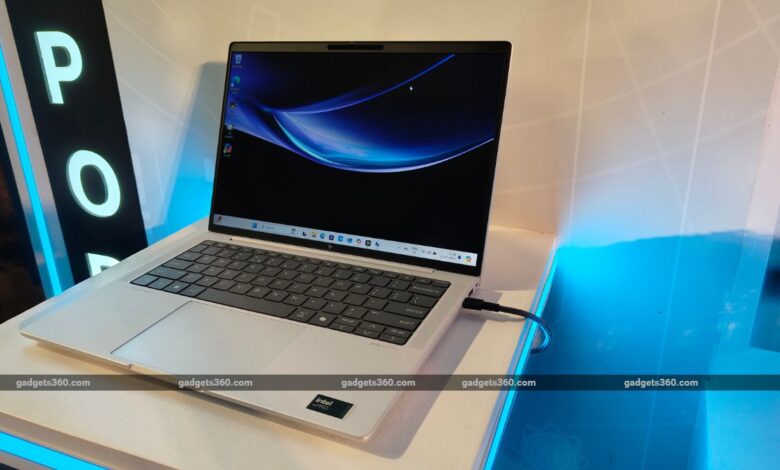Why HP Is Offering On-Device AI Chatbots Powered by GPT-4, Explains Vineet Gehani

HP launched the first generation of its artificial intelligence (AI) PCs in India, the HP EliteBook Ultra and HP OmniBook X. Both devices are powered by Qualcomm’s Snapdragon X series chipsets and feature the dedicated Copilot key, which gives them the Copilot+ PC moniker. The OmniBook X is targeted towards retail consumers whereas the EliteBook Ultra is aimed at enterprise customers. Apart from featuring Microsoft’s OS-based AI features, HP has also innovated the devices with a few first-party AI features.
HP Introduces AI Features in Its AI PCs
Among the HP-provided AI features, the most interesting is an on-device AI chatbot, HP AI Companion, powered by OpenAI’s GPT-4. Packaged as an app, it offers general AI chatbot capabilities where users can ask queries and get responses. It also has an Analyze feature where users can upload documents, PDFs, and text files, and the AI will process them and answer questions about them. The company says the AI chatbot functions entirely offline, so the data never leaves the device.
Additionally, HP is integrating new AI features into the webcam powered by Poly, the company it acquired in November 2022. Users get access to features such as Spotlight that improve the lighting of the person in the frame, background blur, AI-powered filters, and auto framing. Apart from that, Poly Studio also enhances sound quality and reduces noise.
Further, the enterprise-focused devices are also equipped with HP Wolf Pro Security NGAV, an anti-virus software which uses machine learning to learn and update itself about new virus and malware attacks.
Understanding HP’s AI Offerings
HP’s AI offerings are interesting, as it is the only laptop manufacturer that has introduced first-party AI features. However, it also raises a few questions. The HP AI Companion, while a useful tool, will be competing with Microsoft’s Copilot’s chatbot capabilities. The choice of going for the closed model GPT-4 instead of an open-source model such as Mixtral or Llama is also interesting.
Gadgets 360 spoke with Vineet Gehani, Senior Director – Personal Systems category, HP India, to decode these questions and simplify the increasingly competitive AI PC segment. During the interaction, we covered the above-mentioned topics and tried to understand the relevance of AI PCs in present times.
HP AI Companion: A Secure Way to Use AI Chatbots
HP’s AI Companion, powered by GPT-4, is localised entirely within the device. There is an option available to connect it to the server for more complex tasks, but the user has the option whether or not to turn it on. At first glance, this would appear to be a more secure option compared to server-based AI chatbots.
![]()
HP AI Companion
“Everybody wants to do more, but they want to do it for themselves and not necessarily from a public sharing perspective. That is where the private HP AI Companion helps. That’s where all the security features come in.” Gehani said. He further added, taking in a holistic perspective of data security, “We stand by the ethical use of AI capabilities. We have the right firewalling and the right protection equipped against that.”
But will a first-party local AI create friction with Microsoft? The question is relevant since Microsoft is aggressively pushing to dominate the AI PC space with the dedicated Copilot button, and its Windows OS comes with several Copilot-powered features. However, while Copilot sits on the device, the processing of the queries and generation of responses takes place on the cloud, which might make some users apprehensive about data security and privacy.
However, Gehani does not believe there is any scope for friction. “We see this to be complementary. Microsoft is enriching the AI ecosystem with Copilot features such as Cocreate and Live Captions. HP is offering a layer over that. I don’t see this as competing but as a complementary service.”
The Need for a Dedicated Copilot Key
While announcing the AI PC terminology, Microsoft urged original equipment manufacturers (OEMs) to add a Copilot key to qualify their device as either Copilot PC or Copilot+ PC. However, does the key hold any relevance for the end consumer?
“It gives you AI at your fingertips and makes using the AI that much easier. You can just tap the button to take the app live without having to navigate it via multiple clicks. It gives a better experience and makes it more intuitive, Gehani explained.
The Relevance of AI PCs
Despite AI PCs arriving on the market, the average consumer does not have a lot of use case for it. While asking the chatbot a bunch of questions might be fun for a while, the novelty wears off soon. Microsoft has offered several interesting features, but apps and experiences are still limited due to the lack of third-party apps with AI integration. The question that arises is whether the end consumer should invest in devices that have a powerful neural processing unit (NPU) but not enough use cases for them.
“We look at this from two lenses. For business users, it is about data scientists being able to do more. It is about corporate users getting more real-time inference from their workflows. There are also use cases of doing the work faster, more collaboratively, and multitasking,” Gehani said, highlighting that these features are already available with the current generation of AI PCs.
For the retail consumers, it is an evolving journey, explained the HP India Senior Director. While AI can and will provide newer experiences and features in the future. Currently, a big focus is also on improving the existing features. Giving a few examples, Gehani said generative AI is also assisting in improving hybrid work experiences, making audio and video conferences more intuitive, and providing a better battery life in a portable device. He claims that HP laptops have already made significant advancements in providing these experiences. As far as new experiences are concerned, Gehani remains confident that these will soon arrive as well.




